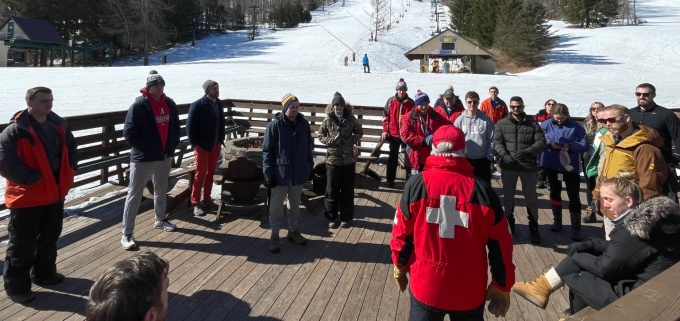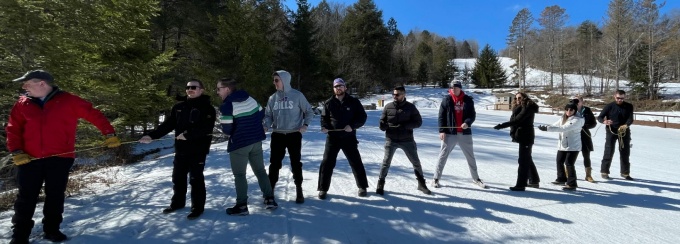Didactic Sessions
The didactic curriculum consists of four major components. All components of the curriculum are required with any exceptions only as specified.
Attendance is logged and 80 percent attendance is required for successful program completion.
The didactic portion of the program focuses on the basic knowledge necessary for the practice of emergency medicine. A weekly core lecture series is designed cover all of the major topics in emergency medicine twice in three years and the minor areas at least once. Residents participate in preparing and presenting core lectures and thereby gain familiarity with the process of formal teaching.
A series of lectures, which provides an introduction to research in emergency medicine, is also repeated on a three-year cycle. Weekly study sessions for each resident class provide an opportunity for intensive learning in a small group setting. An attending leads each group. Over three years each class reads and reviews a major emergency medicine text and other materials. A journal club is structured to train residents in the skills needed to practice evidence-based medicine. Additional special training sessions include: cadaver labs, Hazmat training, air-medical care, emergency vehicle operations, etc.
Study Sessions
Each resident class has a weekly, one hour study session preceding grand rounds on Wednesday mornings at 7:30 a.m. With the exception of residents rotating on the critical care services all residents are excused from other activities to allow them to attend. The focus and methodology differ for each class:
EM1
- Review of core curriculum using Foundations I
EM2
- Review of core curriculum using Foundations II
- Other selected study as time allows
EM3
- Oral boards review and "Mock Oral Boards" sessions, as well as Foundations III
Grand Rounds
Each Wednesday morning Grand Rounds are held from 7:30 a.m. – 12:30 p.m. With the exception of residents rotating on ICU, trauma and orthopedics services, all residents are excused from other activities to allow them to attend. Most sessions are in the Clinical and Translational Science Institute at Buffalo General Medical Center. Every 4th Wednesday of the month, Grand Rounds are held at the Smith Auditorium at the Erie County Medical Center.
Main speaker
- EM or outside faculty speaking on an area of expertise for one or two hours
Core content
- Major emergency medicine core content topics are covered throughout the year
- Pediatric Emergency Medicine core content lectures are given on a yearly cycle
- Toxicology lectures are sponsored by SUNY Upstate Toxicology Dept. on a 36 month cycle
- Presenters include EM faculty, outside speakers, and EM residents
- EM2 residents present three rapid fire lectures throughout the year
- EM3 residents present a Morbidity and Mortality case
Journal Club
Journal club is held four times per year and is hosted at a faculty member's home in the evening. Residents of all levels of training attend together. At journal club, we discuss selected original publications relevant to Emergency Medicine. The primary intent of journal club is to educate faculty and residents in the skills needed for critical interpretation of the medical literature. Secondarily, residents will become familiar with a wide variety of relevant clinical, basic science or administrative topics.
Sign-Out Rounds
Each weekday morning at our primary clinical sites, sign-out rounds occur at shift change (7 a.m./p.m.). This is an opportunity to discuss interesting clinical cases, EKGs and imaging findings.
Our Annual Ski Grand Rounds

